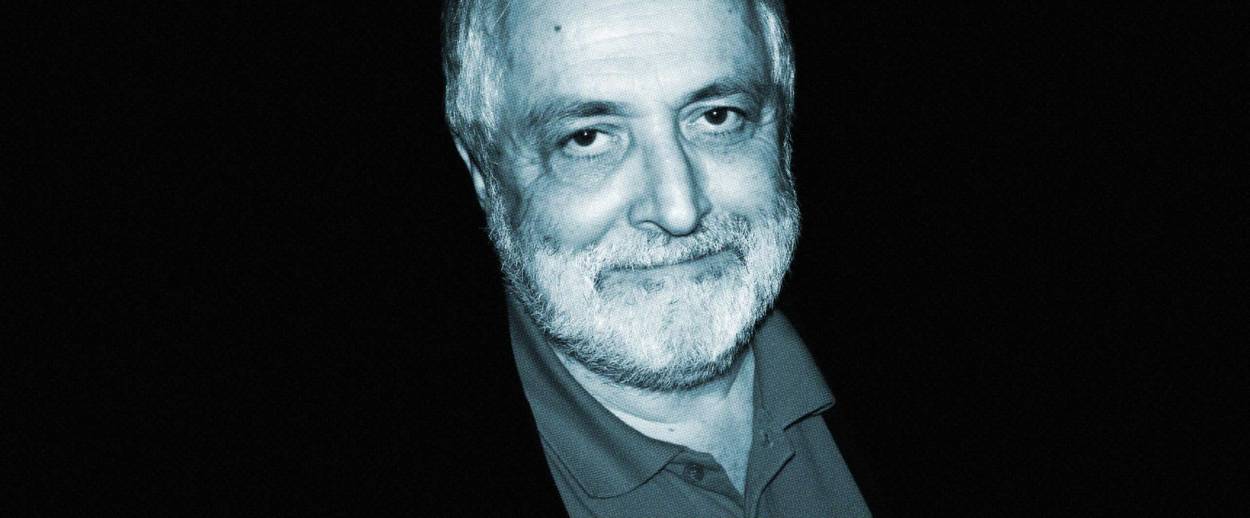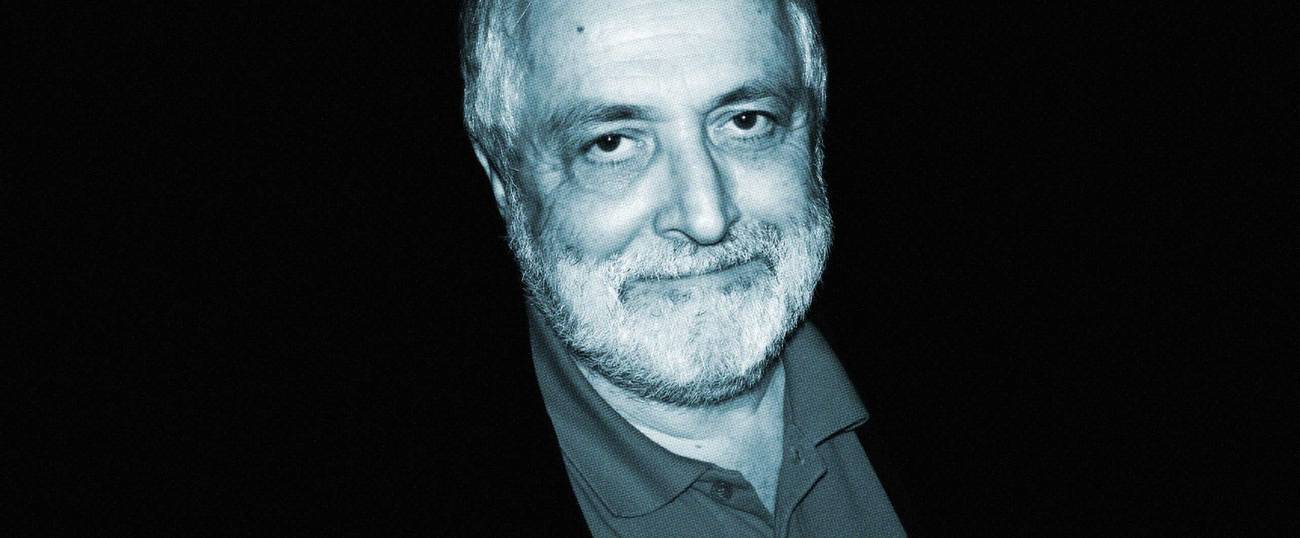At 72, Henryk M. Broder has spent many decades establishing himself as one of Germany’s premier political troublemakers. The influential columnist, gadfly, and media provocateur is almost certainly the country’s best known Jewish journalist and has devoted himself to the cause of defending Israel. On the surface, it would have seemed quite strange and alarming, then, when a photo appeared last week showing Broder being hugged by a smiling Alice Weidel, co-chair of the Alternative for Germany (AfD) party, the closest thing contemporary Germany has to a Nazi party. And yet for those in Germany who have followed Broder’s career, this was not a surprise but the sad and predictable outcome of a sordid decline.
The photo was not the result of an ambush or unfortunate mishap. On Jan. 29, Broder accepted an invitation to address the AfD in the Bundestag, Germany’s parliament. It was the first time the distinguished writer had ever been invited to address a party of the Bundestag and, as is clear in the transcripts of his speech published in the following days, he relished the opportunity to, in his own words, provoke a “shitstorm.” Broder has now openly embraced the AfD and just days after the German Federal Agency for Protection of the Constitution began an investigation into whether the party poses a serious threat to the German constitution and society.
How has it come to this, one must ask, that the son of Holocaust survivors appears in photo ops with Nazi heirs? The answer is that Broder is a virulent case of what we might call Trumpism avant la lettre. This includes vulgarism, denial of the right-wing extremist threat (Trump’s “very fine people on both sides” in Charlottesville) demonization of immigrants, Muslims, the left in general, and other “enemies of the people.” It is a form of derangement operative in Germany as well as in the U.S. It seizes the mind and convinces people who ought to know better—even those who, like Broder, claim to be champions of the Jewish people—that the existence of anti-Semitism on the left means that one need not take it seriously on the right. It convinces such people that all the explicitly fascistic and anti-Semitic outbursts can be written off as anomalies or performative excesses and needn’t be considered a genuine threat.
When he made the decision to speak in the Bundestag, Broder must have known what the German government agency’s recent investigation makes clear—that the AfD are not just right-wing “populists” but a party deliberately constructed in the mold of its fascist predecessors. The party traffics in neo-Nazi slogans like “Germany for Germans” (“Deutschland den Deutschen”). A particularly dangerous AfD member is the Goebbels-wannabee Björn Höcke from the far-right wing of the far-right party, an ultra-extremist faction known in Germany as “The Wing” (“Der Flügel”). Höcke campaigns for a volkish Germany reserved for “German Germans” and in which immigrants whose parents were born elsewhere would be purged from the country.
Broder surely knew about the attacks against immigrants, Muslims, and left wingers in which the AfD is implicated—including firebombs at refugee homes. And, of course, he must have known as well about the increase in anti-Semitic violence in Germany and about the AfD’s public efforts to suppress historical memory and deny German guilt for the Holocaust.
The evolution for Broder from young left-wing radical to his current position entertaining neo-Nazis in the Bundestag has been a strange one. In a 2013 profile in Tablet, David Mikics called him “Germany’s Most Annoying Jew,” and compared Broder to the deceased gadfly Christopher Hitchens—another writer with a penchant for provocation and whiplash-inducing swerves in his public positions. In 1986, Broder published a book, The Eternal Anti-Semite, that took aim at all kind of anti-Semites, from conventional right-wing extremists and neo-Nazis to the far left in all its esoteric varieties. At the heart of the book, there is an argument, as Mikics wrote, that “there’s a link between the obsessive thinking about the Holocaust in Germany and what he sees as an increasing German tendency to condemn Israel.”
Yet the members of the AfD for whom Broder offered his recent friendly address exhibit a different disturbing tendency regarding the Holocaust. Rather than obsessing over it as a vehicle for condemning Israel they suggest that it wasn’t really so bad and thus not worth the fuss, let alone an historical obsession. Notoriously, AfD chapter leader Björn Höcke has called the German Holocaust Memorial a “memorial of shame.”
The younger Broder could be bold and insightful. He was correct in 1976 when he condemned the anti-Semites of the German left for joining forces with Palestinian anti-Semites in Entebbe. He was also correct in documenting the spread of anti-Americanism and pro-Islamism across vast parts of the German mainstream immediately after 9/11.
Indeed, there was a time when Broder demonstrated a degree of intellectual consistency in his condemnations of anti-Semitism; attacks on targets of both the left and the right. In 2007, he mocked Jewish journalist Michel Friedman, former deputy president of the Central Council of Jews in Germany, for the foolhardy idea of interviewing Holocaust denier and neo-Nazi Horst Mahler. The incident prompted Broder to write in the leading weekly political magazine Der Spiegel, that some Jews have “no dignity” at all in their willingness to speak to Jew haters. He argued, as well, against the pro-Iranian ultra-Orthodox Vienna “Chief Rabbi” Moshe Arye Friedman who went to Tehran’s infamous Holocaust denial conference.
But a staunch opposition to Islamism and the “Red-Green Axis” of the left and political Islam, along with his fervent support for Israel made him hostile toward the values of political correctness and German immigration policies and increasingly sympathetic to the far right.
After a long drift into far-right circles, Broder’s final break with reality seems to have occurred in 2014, a few years earlier than the rise of Trumpism in the U.S., with the right-wing nationalist Pegida movement, “Patriots against the Islamization of the Occident.”
In October 2014, Pegida “anti-Islamization” rallies in the city of Dresden drew more than 15,000 people. Pegida founder Lutz Bachmann, infamous for posing with Hitler-style hair and mustache, was charged in 2016 with inciting racial hatred for referring to refugees as “cattle” and “scumbags” and later convicted by German authorities. After Pegida supporters demonstrated on German Unification Day in 2016 in Dresden—a rally that included a neo-Nazi holding up a poster featuring a Goebbels quote—Broder was asked for his reaction and told a German TV station that he was happy with the outcome of the event.
Pegida was a step on the path of Broder’s conversion that has culminated with his embrace of the AfD. Thus, in the curious logic of the day, out of concern for the protection of the Jews from Islamist violence in Germany and the defense of the state of Israel, Broder now aligns himself with political parties that promote explicit anti-Semitism. In a depressing sign of the times, most of the pro-Israel circles and activists in Germany have either supported Broder or remained publicly silent about his radicalization, despite a growing disgust with his actions expressed in private conversations and communications. Truly, Germany’s Zionists deserve better.
Rather than honestly confront the AfD’s beliefs, Broder has attempted to laugh them off with a weak, sanitizing irony, as when he reflected to his audience in the Bundestag, “when does a Jew get the opportunity to perform in a room full of Nazis, neo-Nazis, crypto-Nazis and para-Nazis?” Or when he quipped: “Some of you may never have seen a real Jew in nature and are now waiting for the room to fill with the smell of garlic and sulfur.”
But here is the simple, unironic truth: Almost 6 million Germans voted for the AfD in the last election on September 24, 2017. At no time since the Allies defeated the Nazis in 1945, has a party so actively involved in promoting anti-Semitism and Holocaust denial had as many deputies in the German parliament as the AfD has now or as much power in the country. Leading AfD politicians like Frauke Petry and Beatrix von Storch have publicly discussed whether they want to use weaponry to greet incoming refugees. AfD member Wolfgang Gedeon openly endorses the The Protocols of the Elders of Zion in his 2012 book, The Green Communism and the Dictatorship of Minorities, a book that was displayed at several party conventions of the AfD. AfD MP Markus Frohnmaier, meanwhile, employs neo-Nazis like Manuel Ochsenreiter, a supporter of the Iranian regime. The entire AfD party opposes the freedom of religious observance for Jewish laws like circumcision, and shechita, part of the kosher dietary regulations. One party MP in Saxony made an official inquiry about the “number of people who are circumcised in Saxony.”
Just two days after the photograph surfaced of the “Jewish-Nazi coalition” in the Bundestag, a member of the AfD, Marc Jongen, spoke there. He took the opportunity to aggressively reject commemoration of the Holocaust as a German crime, instead framing Nazi Germany as just another form of “Socialism” like Stalinism or Communism.
The accusation that Broder once flung at another journalist has landed back on him. Today, it is he who poses for an embrace with a grinning leader of his country’s most antisemitic party, who has no dignity.
A response to this article, challenging its author’s characterization of the spirit and substance of Henryk Broder’s speech to the AfD, can be found here.
Like this article? Sign up for our Daily Digest to get Tablet magazine’s new content in your inbox each morning.

